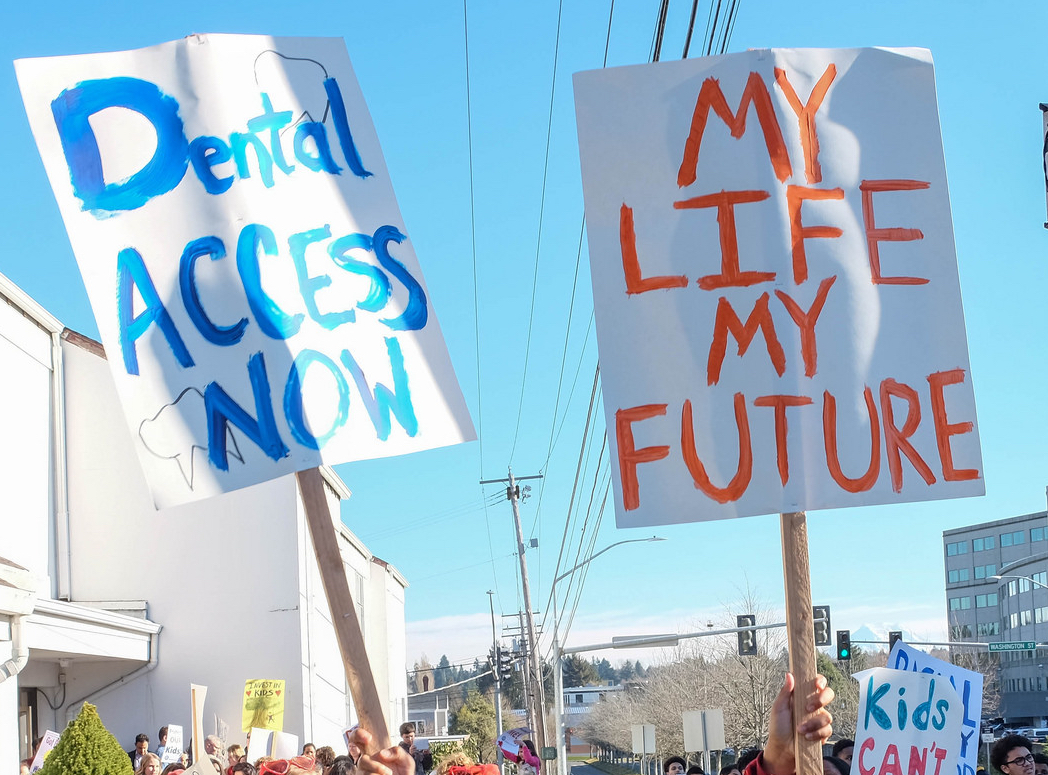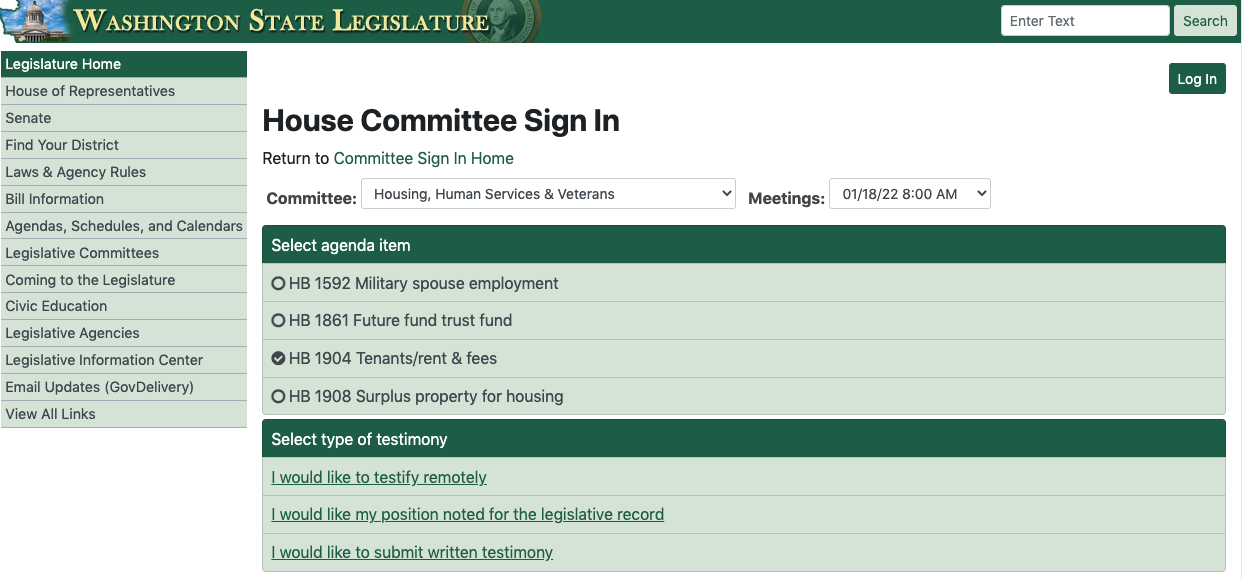
Solidarity Focus: Poverty Action and the Urgent Need for Dental Therapy
Written by: Kendra Allman
Moving into 2022, Washingtonians still do not have proper access to dental care. In fact, 35 out of 37 counties in Washington currently don’t have enough dental health professionals to serve their populations. Those with low incomes, communities of color, and rural communities are disproportionately impacted by these obstacles of oral health accessibility and can have an especially difficult time finding affordable dentists in their areas.
Though we aren’t usually accustomed to thinking of dental care as an urgent need, when gone untreated dental issues can pose a serious threat to a person’s health, day-to-day functionality, and overall quality of life. Even non-urgent dental health issues can pose difficult obstacles for those with limited access to dental care – a bad toothache, for example, can sink one’s mental health and productivity in record time. Many who do have access to dental care, meanwhile, have gone into serious debt trying to take care of their basic dental health needs. And though dental health may not seem immediately connected to housing and homelessness, the relevancy of dental health accessibility to housing stability becomes starkly apparent in struggles like this. In order to live comfortably and affordably, people from all communities must have easy access to health care of all forms.
To address this issue, Poverty Action is pushing a bill that would expand the use of dental therapy in Washington. Poverty Action is a partner organization to the Action Fund, with whom we have worked in solidarity during legislative sessions for years. Omar Cuevas Vega, Policy and Field Coordinator at Poverty Action, was kind enough to give some of his time to talk with me about what this new dental therapy bill proposes and how it has the potential to help the same communities that are most at-risk of housing injustice more easily access dental care.
Firstly, what is dental therapy? The goal of the program is to give someone from a particular community the opportunity to train to become a dental therapist. They would then return to serve that same community. This way, it can be ensured that someone already familiar with a community – its language, culture, and needs – is equipped to provide access to needed dental care. To become a dental therapist, a person goes through a 2-3 year training program during which they focus on about 100 dental procedures, granting them a high competency in providing needed dental health treatments.
Though dental therapy is relatively new to Washington, it has been practiced around the world for over 100 years. Originally introduced to the United States in Alaska in 2010, where it was used to help remote indigenous communities access dental care, dental therapy was brought to Washington by a bill passed in 2017. Under the 2017 bill, federally recognized tribes have access to trained dental therapists from their own communities to provide dental care. However, other marginalized communities in need of similar services – such as urban natives, non-federally recognized tribes, other communities of color, and isolated rural communities – still do not have access to dental therapists. The new bill promoted by Poverty Action would change this, expanding the use of dental therapy across the state.
The Washington Dental Axis Campaign has been working on expanding dental therapy practices for 11 years, and the Dental Therapy Taskforce – made up of health professionals, staff from nonprofit organizations, and other relevant experts – is hard at work getting this bill passed this legislative session. Not only would this bill make dental care more easily accessible for communities in need, but the expanded introduction of dental therapy would provide further workforce opportunities for these communities as well.
The implementation of expanded dental therapy programs would lift a significant burden from low income and marginalized communities across Washington. If you would like to learn more, you can check out the fact sheet, and if you would like to help, please take the time to complete this quick action!
Capitol Re-Caps
Happy first week of the state legislative session!! As most of you know, this will be a short, 60-day session. With week one down, we have eight more weeks to mobilize for housing justice!
The first cutoff is February 3. A cutoff date is the deadline by which a bill must pass a certain step of the legislative process to continue. The only exceptions are if leadership deems a bill necessary to implement the budget (NTIB). Bills not considered NTIB must be passed out of their policy committees by Feb 3. For reference, here is the 2022 cutoff calendar.
The first two weeks of the session are the most critical times to influence budget priorities. This is the time to speak up and be loud, and make sure the lawmakers understand what we need. This week we supported the Governor’s housing and homelessness priorities in four budget hearings. 15 people joined us to testify on the Capital Budget in the House and Senate and 16 people testified with us on the Operating Budget in the House and Senate. Thank you to all who participated!
Let’s keep those actions going! Take Action and write to your lawmakers to invest big in affordable homes this year!
Here are some of our priorities and notes on upcoming hearings:
- $500M in the Capital Budget for affordable homes. This would include funding for the Housing Trust Fund and the Rapid Acquisition Program
- Increasing the Aged, Blind & Disabled cash grant from $197 to $417 per month. ABD funds are for people who qualify for Social Security and act as a bridge while they are waiting for approval.
- $2M for pre-eviction civil aid and an additional $1.3M for tenants' right to counsel.
- $4.5M for foreclosure prevention. We’re working closely with the Washington Homeownership Resource Center to support this priority to protect homeowners from foreclosure.
- $78 M in the Operating Budget to sustain and build capacity for Permanent Supportive Housing and homelessness service providers.
- Housing Justice Act has dropped and we have a bill number: HB 2017! Rep Davis and Rep. Simmons are sponsoring this bill and we anticipate that it will be scheduled for a hearing next Friday.
- We are hoping for Rep. Hackney’s HB 1643 Real Estate Excise Tax (REET) bill to move ahead soon. We have 6 testifiers on deck.
- Anti-Rent Gouging bill from Rep. Peterson will have a hearing on Tuesday, February, 18 @ 8am. HB 1904 Please sign in PRO! To navigate this page, go to the link and select 'Housing, Human Services & Veterans.' Select the date and time and then the bill number. Please then select: “I would like my position noted for the legislative record.” Please reference the screenshot below.

If you are interested in testifying for any of our priorities, please contact Po Leapai, Advocacy Organizer: pol@wliha.org
- wahousingaction's blog
- Log in to post comments

